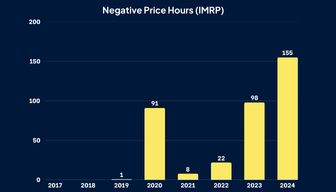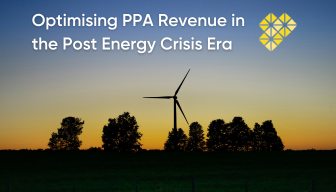Over the past couple of months power markets in the UK and in Europe have been under pressure resulting in dramatic record-breaking power prices observed last week.
- What caused this trend?
- What impact does the current situation have on renewable generators and their PPAs?
The Renewable Exchange team of experts look into the recent events.
The UK power market case
On September 15th, the UK N2EX day-ahead power prices reached record levels of £2,500/MWh. Analysts predict that the high prices may continue due to low wind generation in key markets of UK and Germany.
The high power prices are primarily on account of the UK’s dependence on gas as the main fuel source for electricity generation and the tightness of supply in this market with continued geopolitical concerns around Nord Stream 2. On top of that, just last week there was a fire at the GB-France interconnector (IFA1). It is estimated that the interconnector will remain unavailable until March. This reduction of 1GW capacity will put further pressure on capacity margins in the UK.
The tight margins and high gas prices are not just contained to the UK, though. Europe is also seeing very high power prices with annual power contracts in Germany now exceeding 103€/MWh on Wednesday (15/9/21). This means that the UK will have to pay a premium on any imported power flowing from Europe.
Energy suppliers in turmoil
The record high power prices have put extreme pressure on energy suppliers. It’s clear many suppliers are struggling to cover the significant cost of both hedging and collateral requirements placed on them by industry parties to cover their hedged positions. We’ve seen four UK energy suppliers (PfP, MoneyPlus, Utility Point and People’s Energy) cease trading in the last couple of weeks and one of the largest market players – Bulb Energy – is now seeking a bailout (as reported by SkyNews). The Government began talks with the industry to find means of mitigating the effect of these events and the rising energy prices on the consumers.
Winter 21 and beyond
UK baseload and day-ahead prices continued to rise in recent weeks due to the factors previously discussed. Last week, Winter 21 prices surged to over £180/MWh after the interconnector fire but have since fallen significantly. Nonetheless, with the exception of last week, the positive trend has continued.

Implications for your Power Purchase Agreements
As wholesale energy prices continue to set new records, you may wonder what this means for you as a generator and your PPA renewal price.
“Many generators are choosing to take advantage of the high power prices observed on the market today,” says Ollie Hunt, UK Sales Manager at Renewable Exchange. “In August and September we’ve seen over 100 sites run repeat PPA tenders, for contracts starting as far out as 2023. The majority of sites signing their PPA recently have secured prices 2 times higher than what they’re currently on. Due to current market volatility, we are seeing a greater value difference between suppliers’ PPA offers than before. Fortunately, the digital PPA now available on our platform, has helped the majority of generators secure their PPAs with one-click execution. This option lets them avoid the risks of market volatility and refreshed pricing from offtakers.”
To fully understand what PPA prices you might expect for your assets, head over to the Renewable Exchange platform. The platform calculates bespoke PPA price forecasts based on your asset’s generation profile and current market trends. See an example of a PPA valuation for an asset on the platform below.

The Renewable Exchange platform has a suite of useful features allowing you to better understand the market and react to any changes, too. Trigger price function can alert you of the forecast PPA reaching a pre-set level. Taking advantage of the forecasting tools available, you can then choose an optimal time to open a PPA tender for your assets.
Further support is available from the Renewable Exchange team of in-house experts. If you have any questions, get in touch by emailing [email protected] or calling 0117 405 7931.


